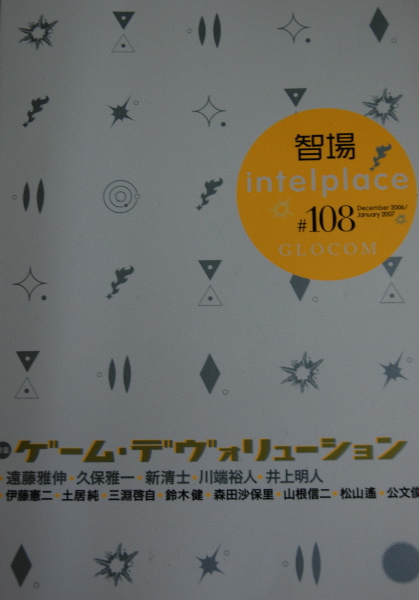Critique of Games: Akito Inoue |
|
This interview is available in Japanese. 日本語で...
Akito Inoue at 26 is a videogame researcher for The Center for Global Communications at the International University of Japan. Having served as Chief Network Officer for GLOCOM, publishing articles in Intelplace journal, this month he will become an assistant professor at the university. Square Haven had the opportunity to meet the game researcher in Tokyo and hear his views on the current state of interactive media.
In the most recent issue of Intelplace, Akito conducts an interview with Masanobu Endo, one of the pioneers of arcade game design. In 1983, straight out of college, Endo had joined the videogame company Namco and developed a breakthrough game. "If Space Invaders was the first impact on the videogame industry," Akito told us, "then Endo-san's game Xevious was the second impact." Xevious was a scrolling shooter, unlike Space Invaders, but this was not what made the game stand out. One landmark innovation was the use of varying sprites for a single object to create a basic animation, so that as an enemy ship approached, the object appeared to be spinning. Back in the days when objects on the arcade screen were entirely static, seeing a spinning ship float across the screen was surprising. There were also instances of what is referred to as maboroshi, or "illusions." Enemies and powerups would appear out of nowhere if you shot in the right places, encouraging players to explore every corner of the level design, thereby gaining a mastery on par with the programmers. The beautiful graphics and sophisticated strategy represented a new standard for arcade games.
Speaking with Masanobu Endo in 2007, Akito received the impression that the renowned game designer was dissatisfied with the trends currently dominating the industry, but is hopeful for the future. As Xevious illustrated, the medium evolves with innovation, not sophistication. When console gaming became big business in the '90s, a lot of developers became risk averse, which Endo believes discouraged creativity. Today, the struggle continues between maverick game designers and the reality of the marketplace.
Of the current game developers, one of the most notable figures to Akito is Yasumi Matsuno. "Matsuno-san's dream is to make human behavior simulated in a videogame," he says. "Battle is not the entire world. There are complex politics to consider." For instance, the game director took a risk with Tactics Ogre by requiring the player to make certain choices that drastically affected the outcome of the game. Choosing whether to ally yourself with a band of rebels or put down the insurrection altered the face of the game world and led to branching storylines. The idea was intriguing to hardcore players but turned off the casual gamers, so many of Matsuno's Quest era innovations were sidelined for his first Square title, Final Fantasy Tactics. When Matsuno took new risks with the battle system of Vagrant Story, he was met by tremendous critical praise and lukewarm sales. In Matsuno's career, Akito maintains, that tension between innovation and convention has always been present.
These were some of our impressions following our time spent with Akito Inoue, an innovative thinker on the history of interactive media and its future trajectory. Square Haven will have more views from Akito at his first available opportunity. For those interested in learning more about his research, check out the postscript he provided for this article on his investigation into the nature of videogame culture and the postmodern. He also maintains the Japanese-language website critique of games.
Jeriaska氏の記事に加えて、日本のゲーム研究の重要人物について少しだけ付け加えさせてもらいたいと思います。 東浩紀 は、日本の若手哲学者の中では非常に著名な人物です。彼は1971年に生まれ、東京大学で博士課程を終えました。彼は、1997年にフランスの現代思想家であるジャック・デリダについての本を書き、一躍、高い評価を得ました。そして彼は、2001年に『動物化するポストモダン』という本を出版します。この本は、日本のオタク文化(Otaku Culture)について、哲学的パースペクティブからの分析を行った本です。彼は、ジャン・ボードリヤールや、コジューヴや、大塚英志の議論を引きながら、結論付けます。「現在の日本のオタク文化の消費形態には、近代人とは異なる意識の在り方が芽生えている」と。それは、ポストモダンの人間の在り方のモデルとなるかもしれない、と言います。 そして、2002年以降、彼は情報社会における自由や倫理の議論を行っています。ジャック・デリダは「書かれたもの(エクリチュール)」についての議論を行った思想家でした。東浩紀の思想は、デリダ、ゲーム、アニメ、インターネットなどを扱っています。その思想のベースには、メディアとは何かということを考えるということがあります。 私は、2005年にはじめて東浩紀と直接会いました。そして、私は東浩紀とともにGLOCOMで働きました。東浩紀はゲームに関する議論に強く興味を持ちました。2006年に、東浩紀はGLOCOMを辞めました。2007年に東浩紀は『ゲーム的リアリズムの誕生』を書きました。この本の中で、ゲームの誕生が、批評の歴史にとって転換点となるだろうと書きました。それは私も主張を同じくするところです。
I would like to add to Jeriaska's article by saying a few words about an important person in Japanese videogame research. Among young people in Japan today who are interested in philosophy, Hiroki Azuma is a well-regarded public figure. He was born in 1971, and acquired a doctorate at The University of Tokyo. In 1997, he wrote a book, unique among Japanese philosophy texts, on the French founder of deconstructionism, Jacques Derrida. In 2001, he published The Postmodern Animal, a book that analyzed Japanese Otaku culture from a philosophical perspective, incorporating ideas from the works of Jean Baudrillard, Alexandre Kojeve, and Eiji Otsuka. His conclusion: Japan's Otaku culture is a clear departure from what it was to be a modern. In Otaku we encounter a possible archetype of the postmodern era.
Since 2002, Azuma has been discussing freedom and ethics in the age of information. As Jacques Derrida was the philosopher who delved into "ecriture," Azuma has explored videogames, anime, and the Internet. His driving inquiry revolves around the question, "What is media and what is human?" I met Azuma for the first time in 2005 and became his assistant. He was strongly interested in discussing games, and upon his resignation from GLOCOM in 2006, he published The Appearance of Realism in Games. There he wrote that the rise of the critique of games would be a turning point for the history of criticism. It is my insistence, too.
Copyright © 1998-2025 Square Haven. This material may not be published or rewritten without crediting Square Haven as the author. Terms of Use



